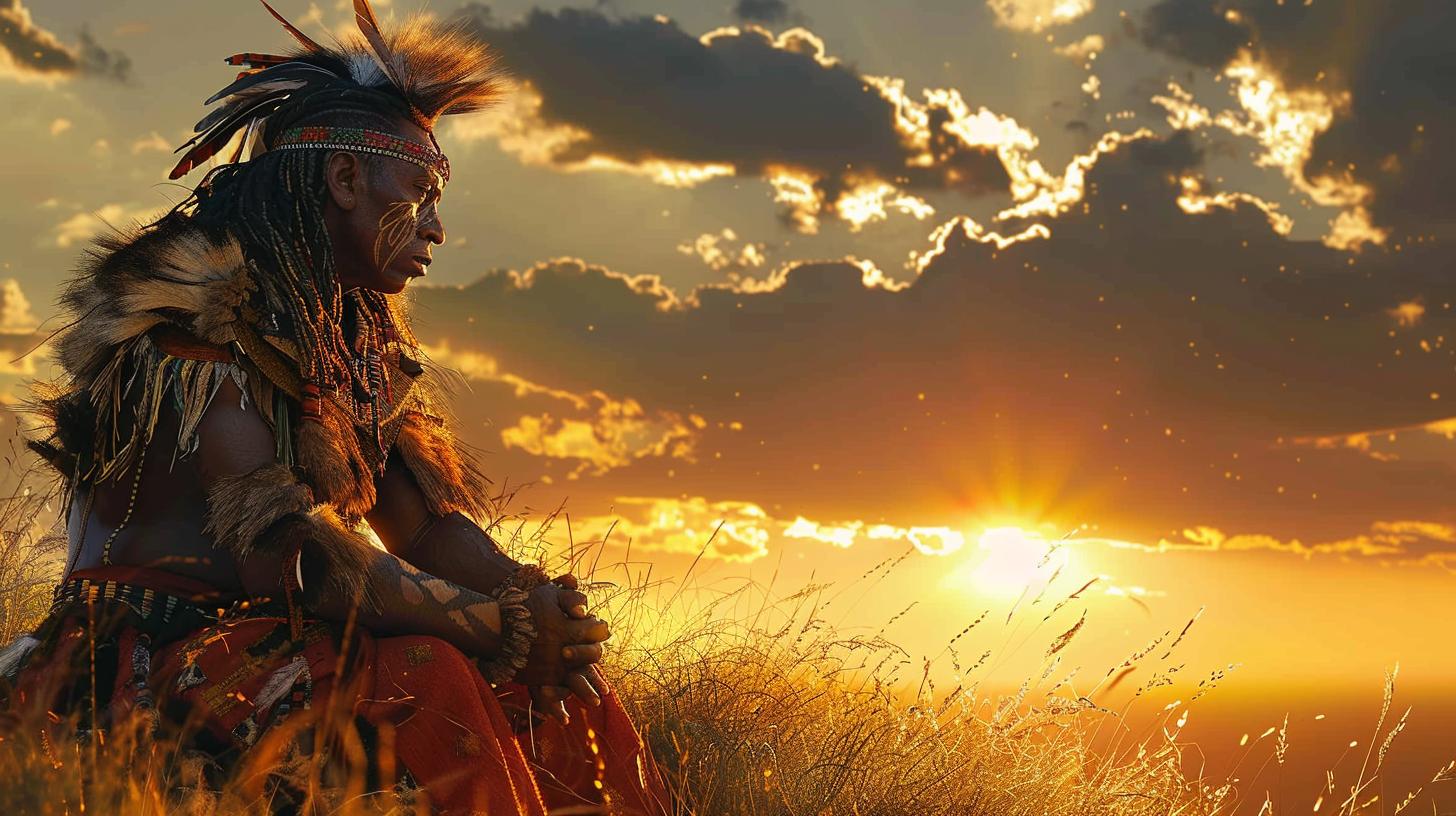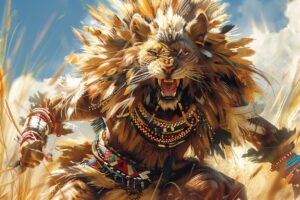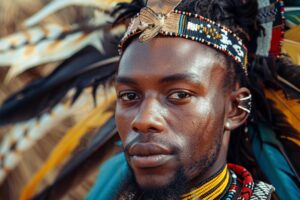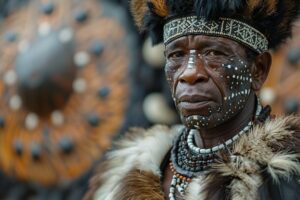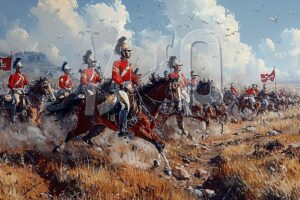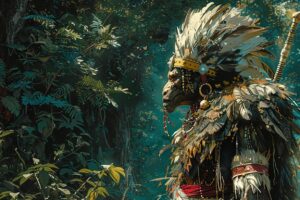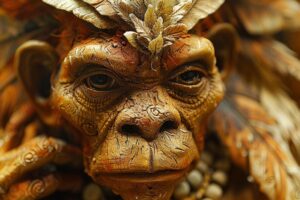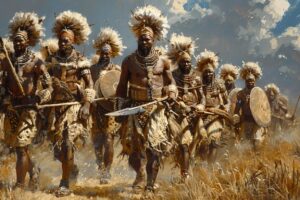Umvelinqangi Zulu Mythology: Insights into Zulu Spiritual Beliefs
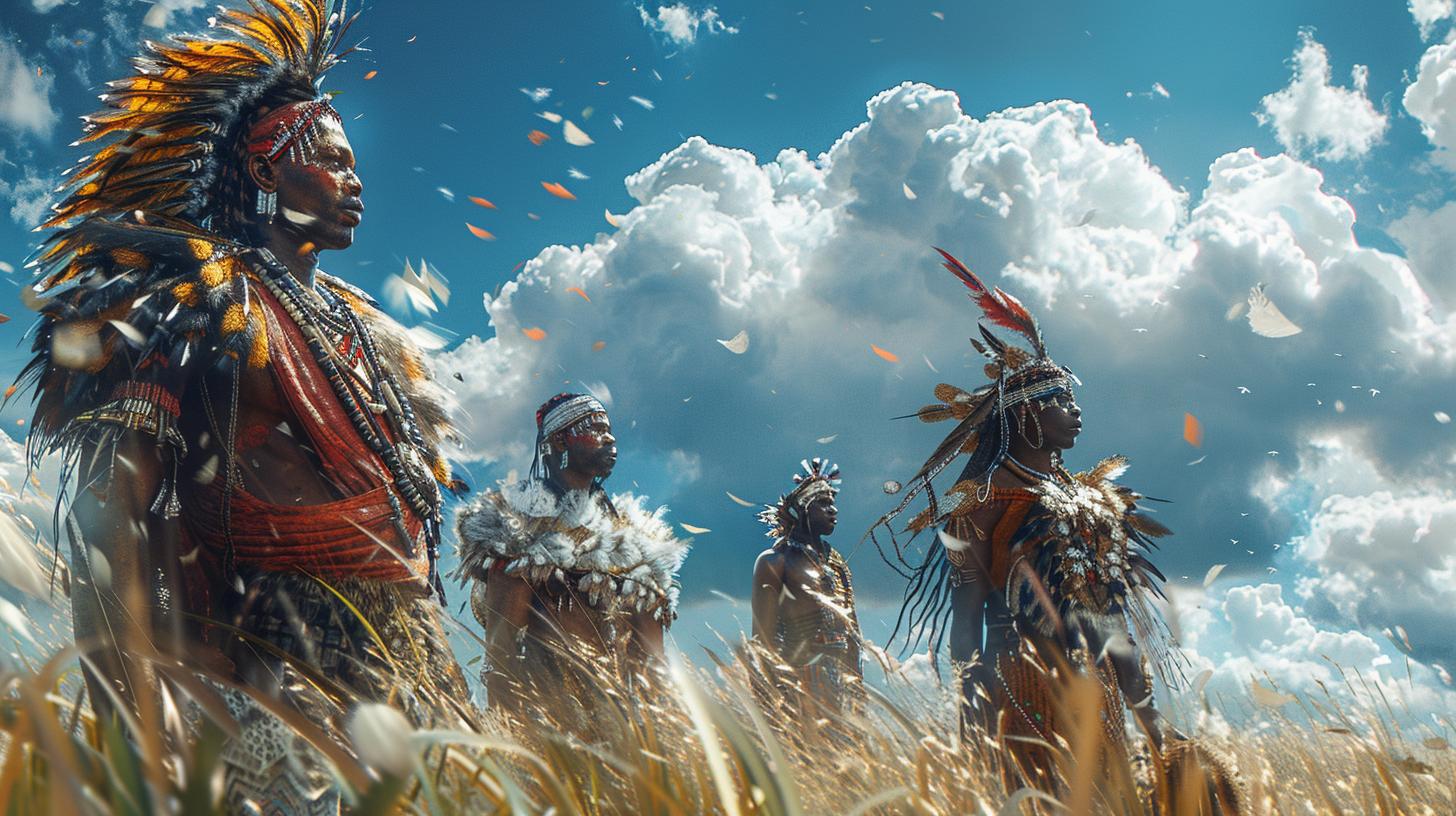
Umvelinqangi Zulu Mythology is an integral part of Zulu spiritual beliefs, centered around deities tied to nature and creation. Unkulunkulu is revered as the Supreme Creator in Zulu tradition, alongside other important figures like Nomhoyi and Nomkhubulwane.
These myths, passed down orally, reflect Zulu’s profound connection to nature and the spiritual world. Debates on the existence of a Sky God continue to shape scholarly discussions on Zulu cosmology and spirituality.
Overview of Umvelinqangi Zulu Mythology
Umvelinqangi Zulu Mythology is an integral part of Zulu spirituality, encompassing a rich tapestry of deities and creation stories. At the core of this mythological system is Unkulunkulu, revered as the Supreme Creator in Zulu belief.
Unkulunkulu’s role in shaping the world and humanity is paramount, reflecting the profound reverence for divine origins in Zulu cosmology.
- Key Points:
- Unkulunkulu: The Supreme Creator in Zulu Mythology
- Deities in Zulu Mythology
- Transmission of Zulu Mythology through Oral Traditions
- Debates on Zulu Mythology and the Existence of a Sky God
- Cultural and Spiritual Significance of Zulu Mythology
- Exploration of the Relationship between Zulus and Nature
- African Traditional Religions and the Zulu Religious System
- Influence of Zulu Mythology on Other Tribes in Africa
- Contemporary Relevance of Umvelinqangi Zulu Mythology to Zulu People
Unkulunkulu: The Supreme Creator in Zulu Mythology
Unkulunkulu, known as the Supreme Creator in Zulu Mythology, holds a prominent place in Zulu religious beliefs.
Revered as the ultimate deity, Unkulunkulu is attributed with the creation of the universe and all living beings.
Role of Unkulunkulu in Zulu Religion
In Zulu religion, Unkulunkulu serves as the central figure, embodying the principles of creation, life, and spiritual guidance. As the Supreme Creator, Unkulunkulu is worshipped and revered by the Zulu people for bestowing existence and purpose in the world.
Unkulunkulu as the God of Creation
Unkulunkulu’s role as the God of Creation is fundamental to Zulu cosmology. Through divine power and wisdom, Unkulunkulu brought forth the elements of the earth, shaping the landscape, flora, and fauna that inhabit the Zulu realm.
Creation Stories in Umvelinqangi Zulu Mythology
Umvelinqangi Zulu Mythology is rich with creation stories that depict Unkulunkulu’s journey of forming the universe and humanity. These narratives illustrate the ingenuity and divine essence of Unkulunkulu, emphasizing the interconnectedness of all living beings in the cosmic order.
Deities in Zulu Mythology
Nomhoyi/Mamlambo: The River Goddess
The Zulu mythology includes Nomhoyi, a significant deity associated with the rivers. Nomhoyi, also known as Mamlambo, holds a crucial role in the spiritual beliefs of the Zulu people.
Nomkhubulwane/Mbaba Mwana Waresa: The Goddess of Rainbow and Agriculture
Nomkhubulwane, or Mbaba Mwana Waresa, embodies the essence of the rainbow, agriculture, and fertility within Zulu mythology.
Her connection to rain and fertility is deeply revered among the Zulu community.
Connection to Rain and Fertility
Nomkhubulwane’s influence extends to the realm of rain and fertility, symbolizing abundance and prosperity in Zulu culture. Her presence is integral to agricultural practices and the cycle of life.
Inkosazana: The Fertility Goddess
Inkosazana personifies fertility and abundance in Zulu mythology, embodying the essence of growth and prosperity within the community.
Her presence is revered during rituals and ceremonies.
uNgungi: The Deity of Smithing
uNgungi, the deity associated with smithing, plays a vital role in Zulu tradition. Revered for craftsmanship and skill, uNgungi’s influence extends to the realm of creativity and ingenuity.
Nyanga: The Moon Goddess in Zulu Mythology
Nyanga, the Moon Goddess in Zulu Mythology, holds a revered place among the deities worshipped by the Zulu people.
She is associated with the luminous celestial body that illuminates the night sky, guiding and influencing various aspects of life according to Zulu beliefs.
- Nyanga’s presence in Zulu cosmology symbolizes the cyclical nature of life, tied to the phases of the moon that regulate the passage of time and the rhythm of existence.
- As the Moon Goddess, Nyanga is attributed with powers related to fertility, intuition, and transformation, embodying the mysterious forces that govern the natural world.
Within Zulu spiritual practices, offerings and rituals are often dedicated to Nyanga to seek her blessings and protection, particularly during important lunar events and celestial occurrences.
The reverence for Nyanga underscores the deep-rooted connection between the Zulu people and the celestial realms, highlighting the significance of the moon as a divine entity in their cultural and religious heritage.
Sonzwaphi: The Deity of Healing
Sonzwaphi is revered in Zulu mythology as the deity of healing, embodying the power to restore health and well-being to those in need. This revered figure holds a special place in Zulu spiritual beliefs, offering comfort and guidance to individuals facing physical or emotional afflictions.
- Sonzwaphi is associated with the wisdom of medicinal plants and healing rituals, providing insights into traditional Zulu healing practices.
- The presence of Sonzwaphi in Zulu mythology highlights the significance of holistic well-being and the interconnectedness of mind, body, and spirit in the healing process.
- Individuals seeking healing often turn to prayers and offerings to Sonzwaphi, seeking divine intervention and guidance on their journey towards wellness.
Ukhulukhulwana: The Stellar Ancestor in Zulu Tradition
In Zulu tradition, Ukhulukhulwana is revered as the Stellar Ancestor, a celestial being of great wisdom and guidance to the ancient Zulus.
His teachings encompassed various aspects of life, from social interactions to agricultural practices.
Teachings of Ukhulukhulwana to Ancient Zulus
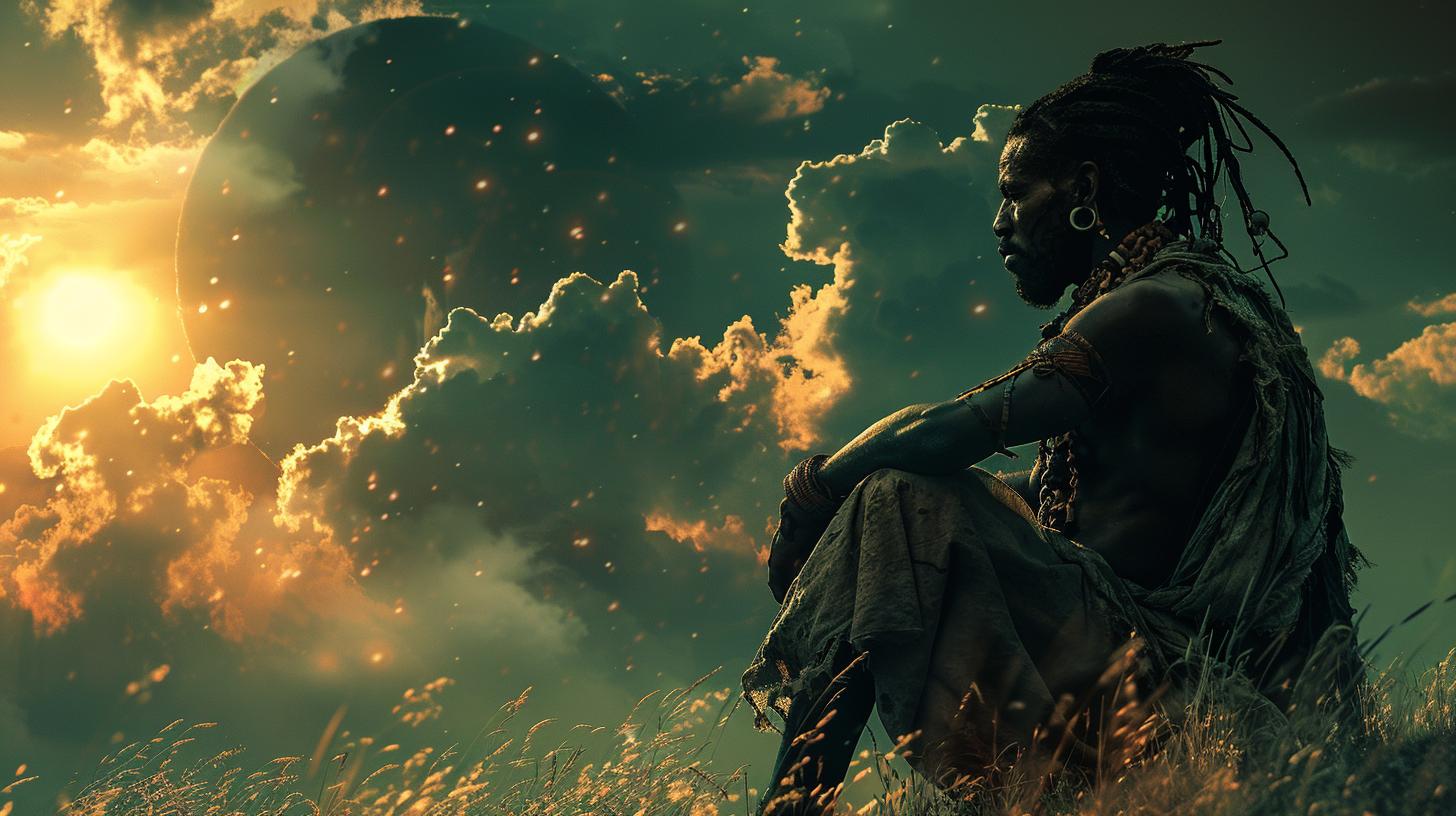
- Ukhulukhulwana imparted knowledge on the importance of unity and harmony within the community, emphasizing the value of cooperation and mutual respect.
- His teachings on agriculture were crucial for the Zulus, offering insights into planting seasons, crop rotation, and sustainable farming practices.
- Ukhulukhulwana also shared wisdom on spiritual matters, guiding the Zulus in their connection to the divine and the ancestral realm.
Transmission of Zulu Mythology through Oral Traditions
The transmission of Zulu mythology through oral traditions is a fundamental aspect of Zulu culture.
Stories, myths, and legends have been passed down orally from generation to generation, ensuring the preservation of the rich spiritual beliefs and traditions of the Zulu people.
Importance of Myths and Legends in Zulu Identity
Myths and legends play a crucial role in shaping the identity of the Zulu people.
These stories not only entertain but also educate and instill values, morals, and cultural practices in the community.
Debates on Zulu Mythology and the Existence of a Sky God
Exploring the intricate realm of Zulu mythology often leads to intriguing discussions about the existence of a Sky God and its significance within the belief system. Scholars have offered varying perspectives on this topic, shedding light on the complexities of Umvelinqangi Zulu Mythology.
Scholarly Perspectives on Umvelinqangi Zulu Mythology
Academic analyses of Umvelinqangi Zulu Mythology delve into the nuances of Zulu religious beliefs and the role of deities in shaping cultural practices. These perspectives offer valuable insights into the spiritual framework of the Zulu people and the foundation of their mythological narratives.
European Influence on Zulu Religious Beliefs
- European colonialism has inevitably influenced the interpretation and documentation of Zulu religious traditions, leading to a complex interplay between indigenous beliefs and external perceptions.
- The integration of European religious ideologies with Zulu mythology has sparked debates on the authenticity and preservation of traditional Zulu cosmology.
Cultural and Spiritual Significance of Zulu Mythology
Zulu Mythology holds a profound meaning in the cultural and spiritual life of the Zulu people, shaping their beliefs and practices.
It serves as a cornerstone for understanding their origins, values, and connection to the spiritual realm.
- Zulu Mythology reflects the intricate relationship between the Zulus and their ancestral past, honoring the wisdom and guidance passed down through generations.
- The spiritual significance of Zulu Mythology extends beyond religious rituals, influencing daily practices, moral standards, and community interactions.
- Through the myths and legends of Zulu culture, individuals find guidance on navigating life challenges, fostering a sense of unity and resilience.
- The cultural richness of Zulu Mythology acts as a source of pride and identity for the Zulu people, reinforcing their distinct heritage and traditions.
Exploration of the Relationship between Zulus and Nature
The connection between the Zulu people and nature is deeply rooted in their cultural and spiritual beliefs.
Nature holds a significant place in Zulu mythology, with various deities associated with natural elements and phenomena. The Zulus revere the land, plants, animals, and celestial bodies as integral parts of their existence.
- Nature as a Source of Wisdom: The Zulus view nature as a powerful source of guidance and knowledge. They interpret natural events and occurrences as messages from the spiritual realm, guiding their actions and decisions.
- Harmony with the Environment: Traditional Zulu practices emphasize living in harmony with nature.
The respect for the environment is reflected in rituals, ceremonies, and daily interactions with the natural world.
- Spiritual Connection to the Earth: Zulu culture acknowledges the spiritual essence present in all living beings and natural elements.
The earth is considered a sacred entity deserving of reverence and protection.
- Celebration of Natural Cycles: Zulu rituals and ceremonies often revolve around natural cycles such as the changing seasons, lunar phases, and agricultural events.
These practices reinforce the interconnectedness between humans and the environment.
African Traditional Religions and the Zulu Religious System
In the context of African traditional religions, the Zulu religious system holds a significant place. Zulu mythology and spiritual beliefs intertwine with broader African religious traditions, reflecting a complex tapestry of cultural and spiritual practices.
The Zulu people’s religious system is deeply rooted in their ancestral heritage and the natural world, emphasizing the interconnectedness of humans, spirits, and the environment.
- The Zulu religious system embraces a holistic view of the universe, where spiritual forces influence everyday life and interactions.
These beliefs shape not only individual practices but also communal rituals and societal norms.
- Central to Zulu religious practices is the reverence for ancestors and the acknowledgment of their role as intermediaries between the living and the divine.
Ancestor veneration plays a crucial role in maintaining harmony within the community and seeking guidance from the spiritual realm.
- Moreover, the Zulu religious system includes rituals, ceremonies, and traditional healers who serve as bridges between the physical and metaphysical realms.
These practices are integral to the spiritual well-being of the Zulu people and are deeply ingrained in their cultural identity.
Influence of Zulu Mythology on Other Tribes in Africa
Zulu Mythology has had a significant impact on various tribes across Africa, influencing their own religious beliefs, cultural practices, and spiritual traditions.
The rich tapestry of Zulu myths and legends has transcended borders, resonating with neighboring tribes and communities.
- Zulu Creation Stories have inspired creation narratives among other African tribes, showcasing the interconnectedness of diverse belief systems.
- The worship of deities such as Nomhoyi and Nomkhubulwane has been adopted by neighboring tribes, reflecting the enduring legacy of Zulu spirituality.
- Ukhulukhulwana’s teachings on civilized living have been embraced by various African communities, fostering a sense of unity and shared cultural heritage.
Contemporary Relevance of Umvelinqangi Zulu Mythology to Zulu People
The Umvelinqangi Zulu Mythology continues to hold significant relevance for the Zulu people in contemporary society, shaping their cultural and spiritual practices.
Let’s explore how the ancient beliefs and myths are intertwined with the lives of modern Zulus:
Continuation of Traditional Practices in Modern Society
1. Ceremonial Rituals: Zulu communities maintain traditional ceremonies to honor the deities and ancestors, blending ancient customs with current societal norms.
2. Cultural Festivals: Events celebrating Zulu mythology showcase traditional dances, music, and storytelling, preserving the rich heritage for future generations.
3. Sacred Sites Visitations: Zulus pay homage to sacred sites associated with their mythology, connecting with spiritual energies and ancestral wisdom.
Preservation of Oral Traditions
– The art of oral storytelling remains a vital aspect of passing down Zulu myths and legends through generations, fostering a strong sense of cultural identity and heritage.
Adaptation to Modern Values
– While upholding traditional beliefs, Zulu people adapt mythological teachings to resonate with contemporary values and societal changes, ensuring relevance in today’s world.
Impact on Art and Literature
1. Artistic Expression: Zulu artists draw inspiration from mythology to create sculptures, paintings, and crafts that reflect the spiritual essence of their beliefs.
2. Literary Works: Contemporary Zulu literature often incorporates mythological themes, providing a platform for exploring cultural narratives and spiritual insights.
Influence on Popular Culture
– Modern media, such as films, music, and fashion, frequently draw on Zulu mythology for creative inspiration, bridging ancient traditions with contemporary trends.
Education and Awareness
– Schools and educational institutions emphasize the study of Zulu mythology to promote cultural awareness and appreciation among young Zulu individuals, ensuring the preservation of their heritage.
.











